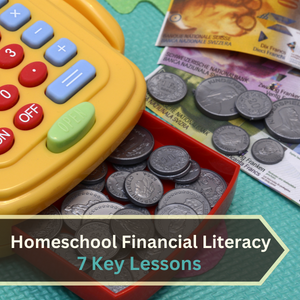Which type of homeschooling is the best fit for your family? The answer isn’t one-size-fits-all. The right homeschooling approach for your family depends on various factors, from your child’s learning style to your own teaching preferences and even your daily routine.
I’m walking this homeschooling journey with you. With a mix of kids, each with their unique personalities and learning styles, I’ve delved deep into understanding the types of homeschooling. Through trial, error, and ample research, I’ve gained insights into the benefits and challenges of each approach.
In this post, we’ll explore:
By the end, you’ll be equipped to make an informed decision about the homeschooling method that’s a perfect fit for your family’s unique dynamics.
Traditional Homeschooling
What is it? It’s a type of homeschooling that mirrors the public school curriculum and framework but in a home setting.
Best for: Families looking for a familiar academic structure and those who value consistency in their homeschooling journey.
Pros:
- Structured Environment: Mirrors the system and curriculum of public schools, offering a familiar framework.
- Set Curriculum: Offers predictability and ease for parents who prefer a pre-defined set of topics and subjects.
- Easy Assessment: Graded textbooks and tests can help in easily gauging progress.
Cons:
- Less Flexibility: May not cater to a child’s unique interests or pace.
- Might Feel Rigid: Some kids might feel confined due to the lack of freedom to explore topics outside the curriculum.
Unschooling
What is it? An organic, child-centric type of homeschooling, where learning branches from the child’s interests.
Best for: Families who believe in organic learning, trust their child’s curiosity, and are comfortable stepping away from traditional educational norms.
Pros:
- Child-led Learning: Kids explore based on their passions and interests, fostering genuine enthusiasm.
- Develops Lifelong Learners: Encourages curiosity and a love for learning.
- Maximum Flexibility: No strict schedules or curriculums to adhere to.
Cons:
- Potential Curriculum Gaps: Traditional subjects might get overlooked.
- Can Be Challenging: Requires a lot of trust in the process from parents.
Montessori Homeschooling
What is it? This type of homeschooling revolves around Maria Montessori’s principles, emphasizing tactile learning and collaboration.
Best for: Families looking for a balanced blend of structure and freedom, and those who value tactile, real-world learning experiences.
Pros:
- Hands-on Learning: Promotes experiential learning, catering to tactile learners.
- Fosters Independence: Encourages kids to be self-directed and responsible.
- Holistic Development: Focuses on developing emotional, social, and academic skills.
Cons:
- Requires Specialized Materials: Some Montessori tools can be expensive.
- Might Be Overwhelming: The approach requires a thorough understanding and commitment from parents.
Charlotte Mason Method
What is it? This type of homeschooling is rooted in literature and accentuates nature, art, and nurturing good habits.
Best for: Families who appreciate a holistic education, love integrating arts, and value spending time outdoors.
Pros:
- Literature-based: Encourages deep reading and comprehension.
- Integrates Nature: Promotes outdoor learning and exploration.
- Holistic Approach: Covers a broad spectrum of subjects, integrating art, music, and literature.
Cons:
- Requires Resources: Might need a rich library or access to various books.
- Less Structured: Some parents might find it lacks the strict routine they prefer.
Eclectic Homeschooling
What is it? A versatile type of homeschooling, allowing parents to draw from various methods to customize the learning journey.
Best for: Families who are not tied down to a single method and enjoy the freedom to adapt and customize their curriculum.
Pros:
- Customizable: Tailor the curriculum to fit your child’s unique needs and interests.
- Flexible: You aren’t confined to one method, allowing room for adjustments.
- Diverse Learning: Can provide a well-rounded education by pulling from various methods.
Cons:
- Requires Time: Customizing and updating the curriculum can be time-consuming.
- Potential Overwhelm: With so many resources and methods, it might be challenging to streamline.
Here are just 5 of the many types of homeschooling. I found another blogger that had some additional ones that might be worth checking out.
Choosing a homeschooling method isn’t about selecting the “best” approach universally, but about finding what works best for your family’s unique needs. The beauty of homeschooling lies in its flexibility, allowing you to pivot and adapt. Remember, your choice isn’t set in stone. You can always re-evaluate and adjust as your family grows and changes. Looking for how to get started visit our article on 7 Essential Steps for Parents to Get Started.
What’s Next?
Diving into the world of homeschooling and not sure where to start? Drop a comment below with your questions or concerns. And if you’ve already started your homeschooling journey, share your insights and experiences with our community. Let’s learn and grow together!





One Reply to “5 Key Types of Homeschooling: Unraveling the Perfect Choice for Your Family”